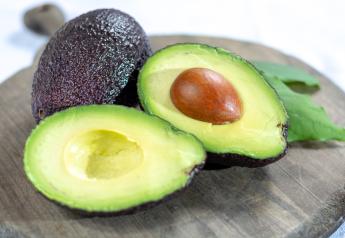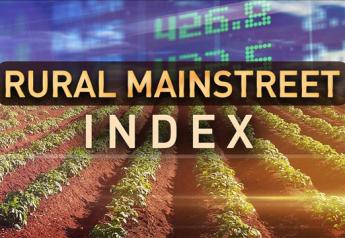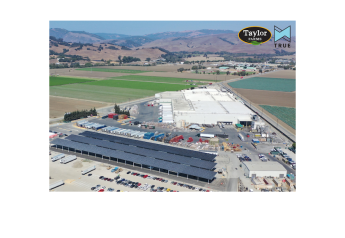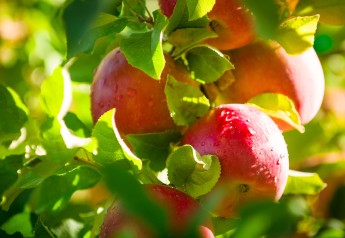Shorter Washington apple crop brings challenges to marketers
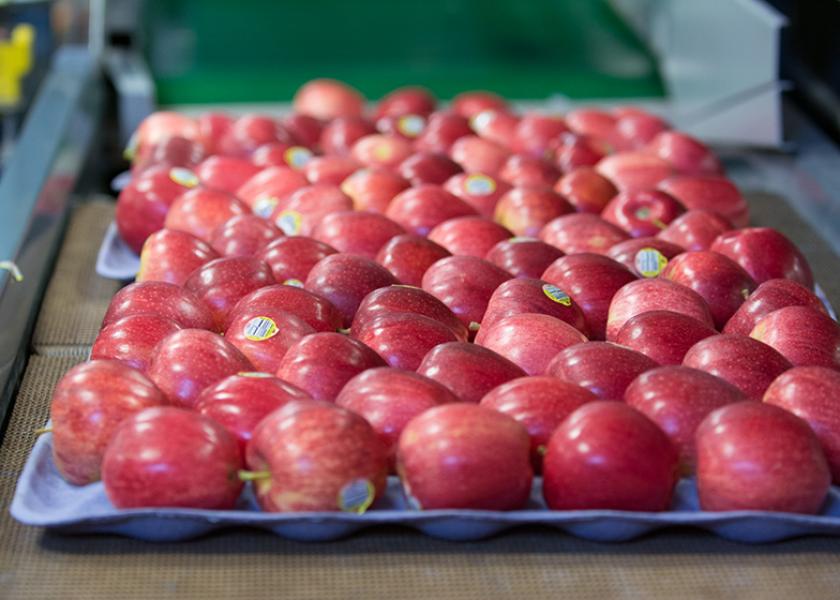
A shorter crop of Washington apples and higher costs for growers this year has caused elevated pricing and new ways to move the crop.
The USDA reports the average price for U.S. conventional apples was $33.12 per carton on Dec. 31, up 12% from $29.49 per carton a year ago and up 24% from $26.77 per carton two years ago.
U.S. fresh apple inventories in storage on Dec. 1 were down 7% compared with last year and off 14% compared with the five-year average, according to a new survey from the U.S. Apple Association.
“Some of the elevated prices come in just because the inputs are higher and fertilizer costs have just gone through the roof,” said Mac Riggan, director of marking for Chelan Fresh, Chelan, Wash., also noting higher costs for labor.
Despite a substantial reduction in crop size compared with 2021, Washington accounted for about 77% of fresh apple shipments in mid-December. Larger crops of fruit in Michigan and New York have allowed shippers in those regions to gain new customers this season.
For the 2022-23 marketing season, Riggan said Washington apples are being sold at about the same pace as most years
“It’s a good crop,” he said. Apples are expected to show strong prices through the summer, Riggan said.
The Washington fresh apple crop for 2022-23 is expected to be just below 100 million cartons, down from 119 million cartons for the 2021-22 crop. Riggan said the smaller Washington crop was surprising in some respects.
“Once [the industry] hits that 118 million carton mark, you just never imagined going below 100 million cartons,” he said. The heat wave of two years ago perhaps had some effect on some apple varieties, he said.

Even so, current 2022 production is way above the 65 million boxes of fresh apples sold in 1990, he said.
Brianna Shales, marketing director for Wenatchee, Wash.-based Stemilt Growers LLC, said the 2021-22 season was a tight crop in terms of supply, and this season is even tighter.
“Despite the smaller apple crop, there are still promotions available on key varieties or size/grade profiles, yet overall, there is a lot more focus on ensuring that demand is as aligned to the supply as possible,” she said. “We see a return to better volumes in 2023 so we don’t want to lose momentum on ensuring that apples are promoted and in consumer minds/baskets.”
With the shorter crop in Washington, Scott Hennessey, sales representative with Evans Fruit Co., Cowiche, Wash., said the marketer is trying to manage its weekly output a little more strictly than in the past. The shipper is aiming to help its loyal customers get through the season, with a supply into the summer, he said.
With elevated market prices this season, he said some retailers are adopting a more flexible size and grade plan. Some varieties are showing an $8 to $10 per box difference when dropping down a grade.
There are some positives for marketers, such as the chance to introduce new varieties to consumers.
“We are introducing a small amount of EverCrisp to our customers this season, ramping up in the coming years,” Hennessey said.
The adversity of a short crop this year may help both marketers and receivers evolve with ideas that were necessary this season that can be carried into future “normal” seasons, Hennessey said.
While higher packing and growing costs have contributed to higher prices this year, the crop of fruit has good quality, Riggan said.
A greater percentage of apple sales may be pushed to the domestic market rather than the export market because of the stronger U.S. dollar and continuing logistic problems in some countries, he said.
Export weakness could result in more apples being sold domestically, he said. That leaves Riggan optimistic that the industry can grow the domestic customer base this season.
Elevated pricing
The higher prices may frustrate retailers, but Riggan said that consumers will adjust.
While some consumers may move to grapes or bananas, Riggan said some consumers are dedicated to apples.
“There are some people that will buy apples, almost no matter what their price," he said. “We will sell apples to fewer consumers this year, but they will be sold.”
While a big crop and cheaper prices could bring more consumers to the category, many consumers are loyal to the fruit.
Typically, about 67% to 70% of the Washington crop is sold fresh, with the balance sold to processors.
Online shopping has introduced new challenges in reaching consumers. While online shopping has declined since the peak of the pandemic, the challenge remains to effectively sell new apple varieties.
“You still have to overcome a significant barrier, and that barrier is the cognitive aspects or the thinking process of how humans decide,” Riggan said.
Retail flexibility
One of the biggest surprises this season is the flexibility buyers have been willing to concede in order to get their orders fulfilled, said Marcus Hartmann, vice president of Pacificpro Sales, Bellevue, Wash.
“Many now show a willingness beyond what we have seen in the past to allow lead time to pack toward orders to adequately cover each client’s individual needs," he said.
While apple demand remains relatively constant, reduced availability is posing challenges in fulfilling orders in a timely manner and contributing to increased fob pricing across the entire manifest, Hartmann said.
“It further necessitates the need to source products from multiple locations across the region, adding complexity to assembling loads and managing the loading process while ensuring quality deliveries to all stakeholders," he said.
Catherine Gipe-Stewart, director of marketing for Domex Superfresh Growers, Yakima, Wash., said retailers have been willing to be flexible to take advantage of what this year’s crop has given the industry.
“We still have a good amount of volume for the 2022 crop, but it may be that a different variety or size is more promotable than had been in previous years,” she said.
“This has created an opportunity for emerging varieties such as Cosmic Crisp and Autumn Glory too.”




